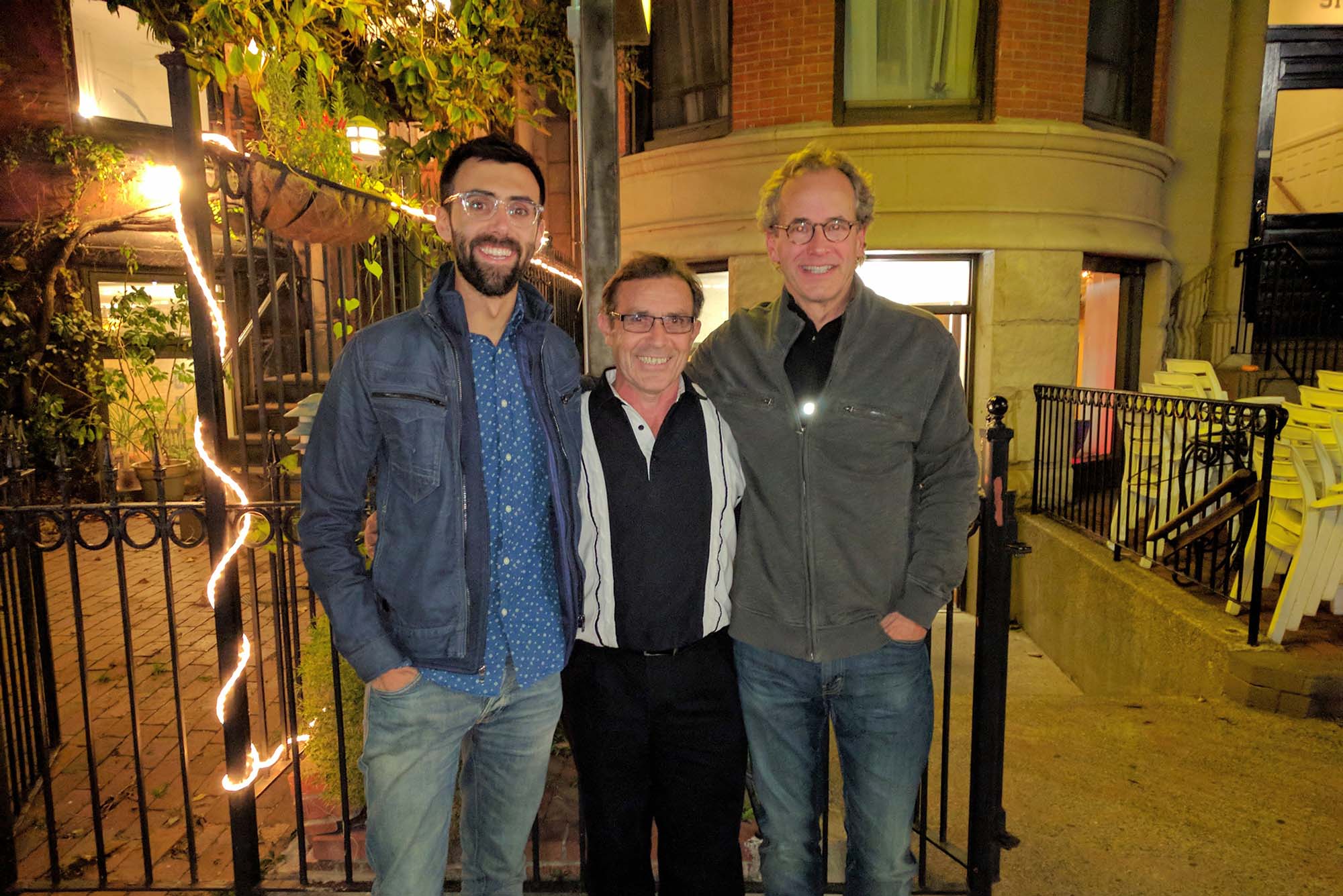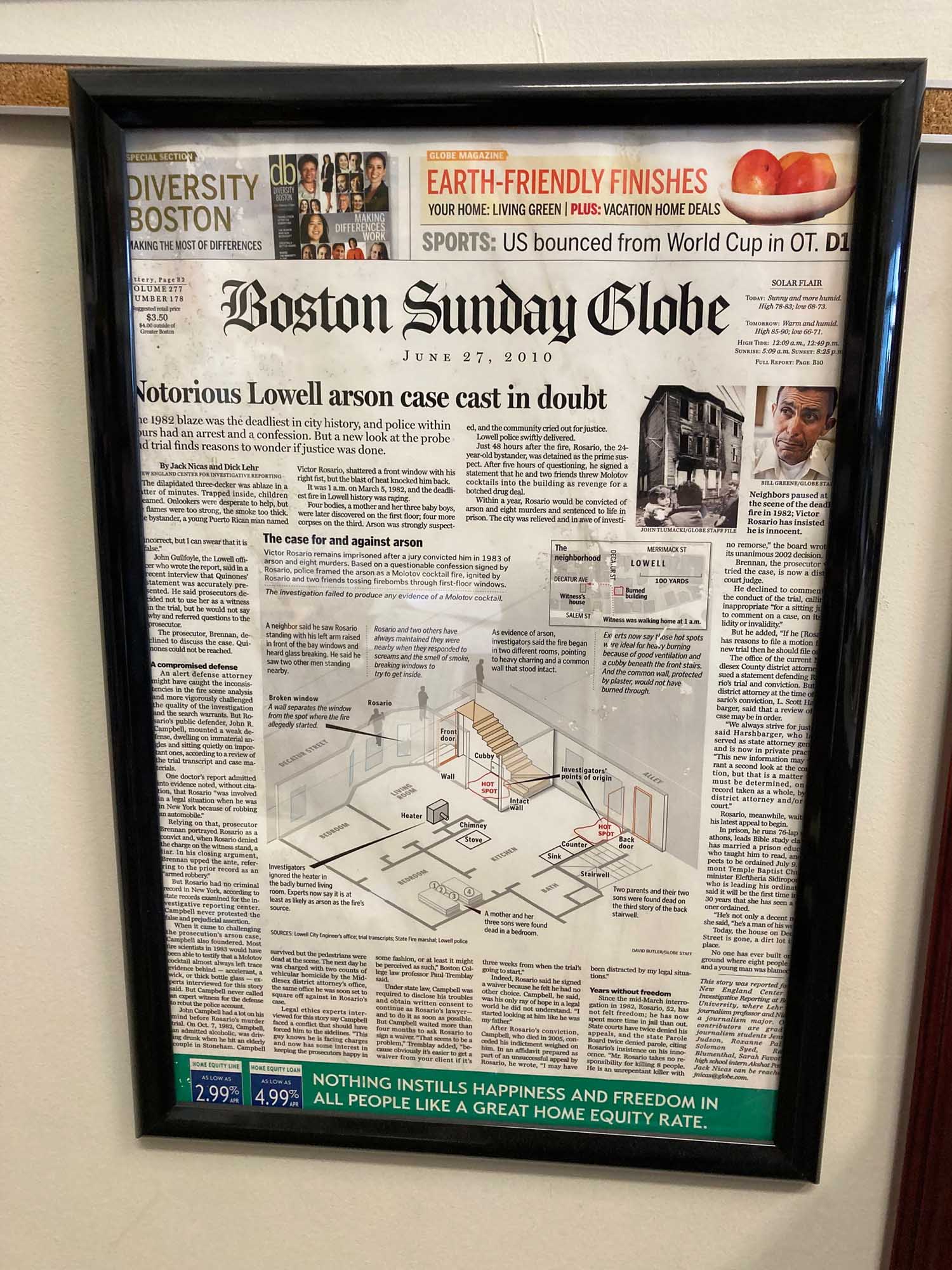A Wrongfully Jailed Man Just Got $13 Million. A BU Duo Helped Win His Release

Jack Nicas (CGS’08, COM’11) (from left), Victor Rosario, and Dick Lehr celebrating Rosario’s release from prison in 2014 after a 1983 wrongful arson conviction. Photos courtesy of Dick Lehr
A Wrongfully Jailed Man Just Got $13 Million—a BU Duo Helped Win His Release
COM’s Dick Lehr and Jack Nicas (CGS’08, COM’11) wrote the crucial 2010 exposé
Childrens’ screams shattered the night from inside a burning three-decker in Lowell, Mass., 41 years ago. Victor Rosario, then 24, punched out a window to try to help, but was blown back in a burst of heat. Eight people, including three babies, died in the fire; two days later, Rosario signed a confession that he and friends had hurled Molotov cocktails into the building. Police called it arson as vengeance for a drug deal gone bad, triggering the most lethal blaze in Lowell history.
But in 2010, Dick Lehr, a professor of journalism at the College of Communication, and Jack Nicas (CGS’08, COM’11), a student volunteer, published a Boston Globe exposé documenting the “junk science,” as Rosario’s lawyer calls it, undergirding the conviction. A judge freed Rosario in 2014. In May, the city of Lowell paid Rosario a $13 million settlement.
“Burn patterns police took to be definitive evidence of arson are now considered common by-products of house fires,” Lehr and Nicas wrote in 2010, adding that “no accelerant, bottle glass, or other physical evidence of the three [alleged] Molotov cocktails was discovered at the scene. Modern fire experts view this as an extraordinary gap, which should have caused police to reconsider their theory.” Beyond that “junk science,” the story noted a “dramatic reversal” by the translator assisting police (Rosario’s first language is Spanish) over five hours of interrogation: the translator said Rosario was delusional from alcohol withdrawal, which, coupled with the language barrier, rendered him unable to understand his confession.
Before coming to BU, Lehr spent nine years, on and off, with the Globe’s Spotlight investigative team; his last big story at the paper reported the case of Shawn Drumgold, who was exonerated of murder in 2003 after spending 16 years in jail. Lehr and Nicas, today the New York Times Brazil bureau chief, spoke with BU Today about the Rosario case and settlement.
This interview has been edited for clarity and brevity.
Q&A
with Dick Lehr and Jack Nicas
BU Today: How did you both learn of the Rosario case?
Lehr: For a few years, Mitch Zuckoff [COM’s Sumner M. Redstone Professor of Narrative Studies] and I did this investigative reporting clinic. Because of my work on the Drumgold case, we always wanted a wrongful conviction as one of the possible projects. I made connections in that world–—the Innocence Project. Through this networking, the Rosario case [seemed] worth looking at. I met with [Rosario’s lawyer]. Very shoestring, didn’t have the resources and time, but she was totally committed. It sounded like a case for us to look at.
We didn’t have our clinic anymore. [But] I wanted to do it with a student. I targeted Jack. I had not taught him, but I had heard that he was an amazing up-and-coming journalist and was interning at the Globe. You could see this guy was going to go places. I felt like I had a Spotlight team colleague, not a student.
BU Today: What smelled wrong about the police investigation that led you to pursue the story?
Lehr: One of the things I always do is go back to the trial record—what was the basis for the conviction—and then testing that evidence. It was all the fire science and reading some independent stuff [about] how that’s junk science. Between the science and the fact that there was no evidence of a Molotov cocktail, this whole arson thing was weak. The other thing is the confession that came after such a long interrogation, the coerced confession. At the Innocence Project, data was being developed revealing how awful coerced situations [are]. It had all the signs. And the guy was an addict.
Nicas: At the time, there was growing consensus in the scientific community that police investigators had relied upon so-called junk science in criminal investigations in years past, including using burn patterns as definitive proof of arson. Such burn patterns were a key pillar of the case against Victor. On top of that, Victor’s lawyers had secured several depositions from people involved in the case that had cast doubt on the conviction.

BU Today: How, and for how long, did you go about your investigation?
Lehr: Definitely spring semester and half of the [preceding] fall semester. A lot of it went into interviewing experts about the confession. A forensic shrink who has done hundreds of criminal cases reviewed the file for us and said this never should have happened.
Nicas: Dick had initially worked with a group of graduate students for a semester, and they were able to pull the investigative documents and the trial transcript, but time had run out in the course to truly dig in. So Dick then revived the investigation during my semester in his investigative reporting workshop.
It was an intense four months of work together. I recall starting by reading the entire trial transcript, which literally filled a large box. We split up the different parts of the case. I took the fire scene investigation, and Dick took the confession. I broke down exactly what the prosecutors presented as evidence of arson—various burn patterns in the charred remains of the house—and spoke to fire scientists about what science actually said about such patterns. The answer was clear: they had nothing to do with arson.
Once we had done a lot of the reporting, we set out to interview several of the people involved in the case, including Harold Waterhouse, the lead investigator from the early 1980s. He had long been retired, but said he recalled the case well; it was one of the most prominent investigations of his career. When we questioned him about the fire science, the issues with the confession, and other holes in the investigation, he responded forcefully, saying that he was sure Victor was guilty. Then he kicked us out of his house.
BU Today: You also interviewed Mr. Rosario?
Lehr: We did a prison interview with him, which was really heartfelt. It went on between an hour and two, and he got emotional and cried. In prison, he became a minister of sorts, ran like Mad Man Marathons. He seemed solemn and serious and candid about [how] he was a heroin addict at the time [of the fire]. He reinvented himself in prison. The gut instinct was this doesn’t necessarily mean he’s innocent, but he’s genuine now.
[Another interview] got a little spooky. It was with someone who had testified for the government, but there was evidence that he was a drug dealer, and lying. It was gumshoe reporting in Lowell, knocking on doors, trying to track down this guy. We finally did. It was in this boarding house, kind of shitty area of town. The lock to the stairways up to the apartment was busted. We cold-knocked on the door. He opens it. It was like a drug den. I’m sure he thought we were cops, two white guys. He’s Hispanic. We explained ourselves, that we were reporters. He let us in. I remember sizing it up: This is not good. This is not safe. I don’t [recall] if there was a big knife out on the table—something—and this guy was not warming up to us. It was borderline hostile, defensive. I’ve got a student with me and started thinking, it’s even worse than if I were just there with a Spotlight colleague, if something would have happened. We didn’t push it. We wrapped it up. We got the hell out.
Nicas: We did interview Victor in English. He was steadfast in his innocence, and he was touched that two journalists were finally taking an interest in his case.
“Although we did this investigation when I was still a student, it remains one of the most impactful and rewarding stories I’ve ever worked on.”
BU Today: What role did your story play in his release four years later?
Lehr: This definitely had a contributing factor, in large part because of the exposure the case got. This is an email from [Rosario’s lawyer] after the story ran: “Your story has brought this case into a new posture.” Suddenly she had an abundance of resources—“We have money now for more experts.” She was new to all this. I was not new from the journalistic perspective. [She wrote] “I have to apologize again for completely failing to understand the value of your interest in the case. Your name is worth its weight in gold in the defense bar.”
Nicas: A story like that, which so clearly lays out all the issues in the prosecution, can be helpful for pro bono lawyers to have something to point to as they’re trying to attract more funding or help. But ultimately, it was those lawyers who deserve the credit for overturning Victor’s conviction. They gathered a tremendous amount of new evidence, filed the appeal, and fought the legal case. We meanwhile publicly rang the alarm.
BU Today: After Rosario was released, did you both follow the case, as he sought restitution from the city? Did that news come out of the blue?
Lehr: It came out of the blue. When he was released, Jack stayed in touch with Victor. We were informing the Globe, letting the Globe know. And they covered it. Since then, it’s fallen off the radar.
Nicas: I did not, really. Instead, I’ve followed Victor’s life a bit. Victor and I have exchanged messages periodically, and Dick and I had the pleasure of having dinner with him and his wife in Boston in 2017. Otherwise, I had moved on from the case. I worked for the Wall Street Journal from 2011 to 2018, where I did write again about junk science in past criminal investigations, and then have been at the New York Times for the past five years.
BU Today: Could such a miscarriage of justice happen again?
Lehr: I’d like to think that it’s harder for that to happen again, because we’re in a period where we’re correcting the injustices that did occur, however frequently, from the ’70s and ’80s. All around the country, wrongful convictions are being overturned. I like to think that, with knowledge about science, it would be harder for it to happen today. But it definitely can still happen.
BU Today: Jack, you’ve had a notable journalism career—how does the Rosario exposé during your student days rate in terms of its importance or the satisfaction you’ve derived from having done it?
Although we did this investigation when I was still a student, it remains one of the most impactful and rewarding stories I’ve ever worked on. It is truly heartening to see him free and receiving compensation from the city for his years behind bars. It instills some faith in the system and reaffirms my belief that journalism can make a difference.

Comments & Discussion
Boston University moderates comments to facilitate an informed, substantive, civil conversation. Abusive, profane, self-promotional, misleading, incoherent or off-topic comments will be rejected. Moderators are staffed during regular business hours (EST) and can only accept comments written in English. Statistics or facts must include a citation or a link to the citation.